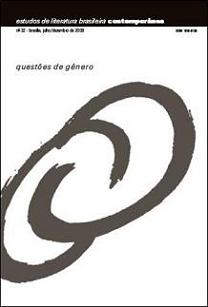Narrativas cosmopolitas:
a escritora contemporânea na aldeia global
Abstract
O trabalho discute como os pressupostos teóricos da contemporaneidade podem ser pensados em termos dos estudos de gênero, tomando-se por base o conto de Marilene Felinto, “Muslim: woman”, que reflete sobre questões de gênero em um contexto transnacional.
Downloads
References
CHOW, Rey. Writing Diaspora: Tactics of Intervention in Contemporary Cultural Studies. Bloomington and Indianapolis: Indiana University Press, 1993.
COSTA, Claudia de Lima. “Feminismo, tradução, transnacionalismo”, em _______ e Schmidt, Simone Pereira (orgs.). Poéticas e políticas feministas. Florianópolis: Editora Mulheres, 2004. pp. 187-96.
CRAIG, Amanda. “Monica Ali”. The Sunday Times. dez. 2003. Disponível em:<http://www.amandacraig.com/pages/journalism/interviews/monica_ali.htm. Acesso em: maio de 2008.
FELINTO, Marilene. “Muslim: woman”, em Vianna, Lúcia Helena e Guidin, Márcia Lígia. Contos de escritoras brasileiras. São Paulo: Martins Fontes, 2003. pp. 229-38.
HOLLANDA, Heloisa Buarque (org.). Tendências e impasses: o feminismo como crítica da cultura. Rio de Janeiro: Rocco, 1994.
_______. “Os estudos de gênero e a mágica da globalização”, em MOREIRA, Nadilza Martins de Barros e SCHNEIDER, Liane (org.). Mulheres no mundo: etnia, marginalidade e diáspora. João Pessoa: UFPB, 2005. pp. 13-20.
MARX, John. The Femininization of Globalization. Cultural Critique, nº. 63. Spring 2006, pp. 1-32.
MCLUHAN, Marshall. The Global Village: Transformations in World Life and Media in the 21st Century. New York: Oxford University Press, 1989.
PRATT, Mary Louise. Imperial Eyes: Travel Writing and Transculturation. London and New York: Routledge, 1992.
ROBBINS, Bruce. “Introduction Part I: Actually Existing Cosmopolitanism”, em CHEAH, Pheng e ROBBINS, Bruce (ed.). Cosmopolitics: Thinking and Feeling beyond the Nation. Minneapolis: Minnesota UP, 1998. pp. 1-19.
SHOHAT, Ella. “Estudos de área, estudos de gênero e as cartografias do conhecimento”, em COSTA, Cláudia de Lima e SCHMIDT, Simone Pereira. Poéticas e políticas feministas. Florianópolis: Editora Mulheres, 2004. pp. 19-29.
SPIVAK, Gayatri Chakravorty. “Claiming Transformation: Travel Notes with Pictures”, em AHMED, Sara et al. Transformations: Thinking through Feminism. London and New York: Routledge, 2000. pp. 119-30.
_______. Death of a Discipline. New York: Columbia UP, 2003.
_______. “Diaspora Old and New: Women in Transnational World”. Textual Practice, v. 10, nº. 2. 1996, pp. 245-69.
_______. “Can the Subaltern Speak?”, em Nelson, Cary e Grossberg, Lawrence (ed.). Marxism and the Interpretation of Culture. London: Macmillan, 1988. pp. 271-313.
_______. “Foreword: Upon Reading the Companion to Postcolonial Studies”, em Schwarz, Henry e Ray, Sangeeta. A Companion to Postcolonial Studies. Oxford: Blackwell, 2000. pp. xv-xxii.
VIANNA, Lúcia Helena. “Poética feminista ”“ poética da memória”. Labrys: estudos feministas, nº. 4. Brasília, ago.-dez. 2003. Disponível em: <http://www.unb.br/ih/his/gefem/labrys4/ textos/lucia1.htm>. Acesso em: maio de 2008.
Downloads
Published
How to Cite
Issue
Section
License
Authors who publish in this journal agree to the following terms:
a) The authors maintain the copyright and grant the journal the right of first publication, the work being simultaneously licensed under the Creative Commons Attribution License-Non Commercial 4.0 which allows the sharing of the work with acknowledgment of the authorship of the work and publication this journal.
b) Authors are authorized to enter into additional contracts separately, for non-exclusive distribution of the version of the work published in this journal (eg publish in institutional repository or as a book chapter), with authorship recognition and publication in this journal.
c) Authors are allowed and encouraged to publish and distribute their work online (eg in institutional repositories or on their personal page) after the editorial process, as this can generate productive changes, as well as increase the impact and citation of published work (See The Effect of Free Access).
d) The authors of the approved works authorize the magazine to, after publication, transfer its content for reproduction in content crawlers, virtual libraries and the like.
e) The authors assume that the texts submitted to the publication are of their original creation, being fully responsible for their content in the event of possible opposition by third parties.


